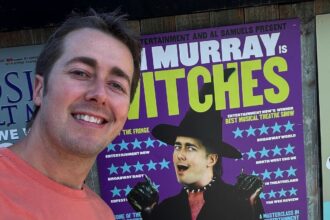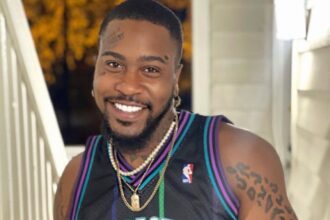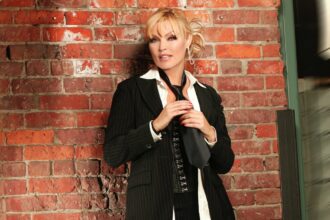
How did this show come about?
Where do I begin? So, what had happened was in January of 2023 my dear friend Carole Cook passed away – the prolific actress – and she was very much a fairy godmother to me. She was my dearest friend. She was a confidant. She was a muse, and she passed away, and life was at a low. Life was the lowest it had ever been, because in 2015 my mother was diagnosed with a brain disease called FTD, Frontotemporal Dementia, or Frontotemporal Degeneration. I’m from Alabama, I was living in Los Angeles, and Carole and I got a lot closer when mom got sick.
And essentially, I got to rock bottom once Carole died. I went on about a two-week sort of West Hollywood bender at all the gay bars, doing all the things – which I was no stranger to. I had done that more than several times in my life, but it was it was spiraling towards rock bottom.
After about two weeks, I had a bit of an awakening. It wasn’t a full awakening. The full awakening happened later, but there was a little crack of light and it was kind of met with desperation. I knew that I had to find myself and I knew that if I started to clear debris in my life, then I could find myself – and the first piece of debris for me was quitting drinking. I quit drinking two weeks after Carole died and life started to open up to me. I started to find hope again, and I started to find myself again, and then my mom died, hence the title, “Carole Cook Died for My Sins.” I truly believed that from the other side, Carole kind of said, “get it together, kid”. And then, after my mom died, I really started to find myself.
I started to experience all of these truths and all these awakenings and what I call magic. I started to believe in things again. When my mother first got sick, I kind of gave up. I stopped believing in everything, but my friend Carole brought me back. And so, back in January of this year, I felt pulled to New York by Carole.
I didn’t know why, but I knew it had something to do with my story. I knew it had something to do with sharing with people, anyone who would listen, these truths I was learning, these awakenings I was having and this magic that was happening. I rented an apartment in New York, I did a sublease, and four days into me being in New York, I had this idea for this one person show.
I realized then that in order to share the light and to share the magic, I had to start with the darkness. And that’s when I started writing it all down. That’s when I started going back and really going through the journey of rock bottom to these epiphanies – and that was the impetus for the show.
It’s a 75-minute piece and it’s just me on stage, which is quite daunting. But it’s all linear in that it’s the journey of light to dark. But I am also able to go back and talk about my mother, about me growing up in Alabama and coming out of the closet. I call it a love letter to both my mother and to Carole. That was a windy way to answer that question!

You call the show a sermon. How did that word come into play?
It’s funny because it’s a play in that I’m on a stage and I’m saying lines that I wrote and I have an audience, so therefore it is a play. But to me, I always say there’s nothing “play” about it. I’m not playing pretend. If anything, it’s a truth and It’s a chance for me to tell my truth and tell my gospel. I grew up in conservative Alabama and I’m kind of pushing back on a lot of things that I was taught.
I call it my sermon because I want to say, “Hey people, wake up.” We’re all here and we know how it’s going to end. We’re all going to die and we all have different ideas of what happens afterwards, but in the meantime, what are we up to and what are we doing?
I felt it was my gospel and it was my truth and it’s a sermon because it’s my take on things. It’s my take on what spirituality is and it’s a take on what identity is. It’s a take on what sobriety is and it’s my take on hope and it’s my message.
It’s bold to call it a sermon. My niece, who’s 14 years old, she’s not able to see the play because she’s not old enough yet, said to me, “What about when people find out that it’s not a real sermon?” Because she thinks the sermon is a church and I said, “Oh my dear, a sermon can happen anywhere.” A sermon can happen in a coffee shop. A sermon can happen on a sidewalk. My sermon is happening in a theater. The theater has always been a sanctuary to me and a sanctuary to my friend, Carole. And so, it is a real sermon.
What is the experience like sharing so much about your personal life on stage?
Well, I haven’t done it yet in front of an audience…well, actually, that’s not true. I did a private reading and that was very thrilling and freeing. You know, what happened is once I started writing, once I decided that in order for the light to be as bright as it can be, I had to go to the dark.
One of the biggest pieces that I speak of in my sermon is shame. That’s one of the themes of the piece and when I talk about sobriety, it doesn’t necessarily mean alcohol. When I talk about sobriety, I mean, one’s foundedness, one’s calm, one’s strength – that’s what sobriety is. You are able to look back on your past and look back on the things that you’ve done and realize that it was a reflection or a response to something that was happening in your life.
I am able to do that and it was getting easier and easier as I was writing it to look back and go I can write about that and I can tell those stories, because I’m not that anymore. I don’t have shame surrounding a lot of the stories that I tell. This show is not just shame filled. We begin with shame filled, and then we talk about how we absolved ourselves of that. So, it was difficult at the beginning. Actually, today we were in rehearsal, there’s a moment where I share a piece of truth that someone said to me. When I first started writing the piece, I didn’t think I was going to say those words out loud because it was so uncomfortable to say them. And now I can’t wait for the audience to gasp when they hear what I’m about to say. And I think that that’s me. You know, I don’t want to pat myself on the back and say that’s growth, but it is growth and it’s forcing you to meet yourself.
It’s meeting yourself and all the pieces of you, whether you like them or not. And when you’re able to do that – and I’m still doing it every single day – I hope to be meeting myself until the day that I die. When you’re able to meet yourself and you’re able to look at the light and the dark, you’re able to grow from it – and you’re able to not do it again but also understand the why of why you did that, to label it and to understand it.

What was it about Carole that was just so appealing to you?
I talk about this in the play. I first met Carole when I was 18 years old and she was doing Hello Dolly in Birmingham, Alabama. She was the second Dolly after Carol Channing. She did it in 1965 and she reprised that role one time. And it was as a favor for Fannie Flagg, the author who wrote Fried Green Tomatoes. Fannie’s from Alabama and she said, “Carole, come to this thing. There’s this amazing regional theater in Birmingham, Alabama, and they’re gonna do Hello Dolly.” And so, she got Carole to do Dolly.
So, I’m 18 years old and I go with my mother and I see Carole Cook in Hello Dolly and I didn’t know who she was at that point. It was the most brilliant and exciting performance I’ve ever seen in my entire life. Carole Cook was a consummate performer.
If you met Carole Cook on the street, she made eye contact with you and she drew you in and she did the exact same thing on stage. I had never experienced anything like that. And to me, she was a throwback. You know, her mentor was Lucille Ball. To me, I’m an 18-year-old kid in Birmingham, Alabama, dreaming of Hollywood. I’d never even been to LA yet. To me, it was like watching old Hollywood in front of me.
I saw the show like four or five more times and I waited at the stage door. When she came out at the stage door it was Carole and her husband, Tom Troupe, and she had worn a wig on stage. She didn’t have time to have her hair done and she wore this gorgeous black turban and she had on a big cape and she had a carpet bag – which to the day she died, she would put all of her makeup in it and her things for when she was getting ready for a show. She looked like Sunset Boulevard. I’m waiting for her and she came out and she was just so gracious.
I got to meet this woman that I saw sparkle on stage and I was mesmerized by her. And then, through the magic of Hollywood, I came out to California. I go to school here. I went to Pepperdine. I graduate. And eventually, about seven years after I first met her, I ended up in the same room with her. She always would poke at me and say, “I gave you my telephone number and you never called me.” I was in college and I was doing theater. I was distracted, but then she would say, “if you had called me, it wouldn’t worked out. It worked out exactly how it was supposed to.” The timing was the way it was supposed to be and we just sort of fell into each other.
She was, you know, in her mind at the end of her career and I didn’t even have a career. I was auditioning for anything and everything. I saw her and she saw me. There was a 60-year age difference and when she passed away, I remember everyone reaching out and they said, “Oh, I’m so sorry about Carole. I know she was like a grandmother to you.”
No, no. Carole Cook was not a grandmother to me. Carole Cook was a friend and the reason she was a friend is because she treated me like a contemporary. She trusted me and I trusted her. We had something we had something very, very unique and it was an adventure every single time I was with her.
I still get excited talking about Carole Cook. To be clear, there was Carole, and then there was Carole Cook. Sometimes I would be out to dinner with her and her husband Tom, we would go to this place called Café de Toile in West Hollywood. We’d be sitting at dinner. Carole would be having her martini, and I would catch her voice. And I would realize I was sitting across from Carole Cook. I was sitting across from that actress that I fell in love with on stage.
And I was telling this to my director, Cameron Watson today in rehearsal. That feeling never went away. And to the day that I told her goodbye and I did, in my own way, tell her goodbye, that feeling never went away. She was a dream and I think that’s one of the reasons I felt so compelled to write this piece. My two people left this realm. They didn’t leave – and you’ll find that out in the play. They didn’t leave. I found them again, but they left this realm at the same time and I knew it was going to happen that way.
My biggest concern was what if it happens at the same time? What do I do? They left this realm three and a half months from each other. And I’m learning that I’m believing in all sorts of things again, and on some spiritual level, I think Carole said, I’ll go first. And I know that sounds strange to say, it’s not like Carole Cook planned her death around Mason McCulley, I don’t think that. But, you know, I don’t know how things work, and I’m learning how things work by writing this play, but I think on some level she says, I’m gonna go first.
She went first and I went cuckoo and then I heard her the day that I decided to let light in was the day that I said no more, no more playing, no more drinking. I heard her and she said, keep going. And she gave me a gift because I got to be next to my mother sober when my mom died. And Carole would have done that for me. Carole would have done that for me.
That’s just so awesome. I mean, you had kind of alluded to Birmingham, but are you planning to take the show on the road?
It’s funny you say that. I would love to take it on the road. My dream is to do a little gay tour and take it to Palm Springs, San Francisco, Provincetown, Fire Island, Key West, New Orleans, all the places that Carole had a lot of fans. I want to do that.

Mason McCulley Answers the Socialite Seven
What is your biggest pet peeve?
Negativity. And it didn’t used to be that way. It didn’t used to be negativity, but in this new awakening of myself, it’s far more likely for something wonderful to happen than for something bad to happen.
What is your most cherished possession?
I was thinking about this. I don’t know what my most cherished possession is. I don’t know. My most cherished possessions are my people.
But I will say this. I have worn this particular bracelet. I’m going to wear it on stage. I have worn this for a good, almost 20 years. It was given to me by a friend’s mother. It’s a little bit of a safety blanket to me. I wear it because it reminds me of my people and I panic if I cannot find this bracelet.
Who would you want to play you in the movie of your life?
I have no idea. I truly don’t know. I was looking at that question and I was like…we’re not allowed to say pass, are we?
You can say anybody you want. I’ve had people say “me”.
Me? Oh, I’ll pull a Joan Rivers. You know, Joan Rivers did that. She played herself in the made for TV movie. Well, you know what? I’m kind of doing that. I’m not kind of, I’m doing that in this play. I’m playing myself. So, you know what? I’ll play myself.

If you could wake up in the morning with a superpower or a talent that you don’t already have, what would you want it to be?
To live without fear. To live with fear drives us in so many ways that we don’t even realize. It’s driving us and doing this play has taught me that fear is not real and it creeps in and it can control things. If I could live without fear, I bet I could accomplish anything I wanted.
What are three things you can’t live without?
Diet Coke. In my, in my sobriety, it’s diet Coke. I call it the last vice. I’m trying not to, but definitely diet Coke. I don’t know. God, I’m not doing well with this. Laughter, diet Coke and music. That sounds so cheesy.
What is your idea of perfect happiness?
Peace of mind. I think that it goes back to that question of fear. Peace of mind is I think the perfect happiness. I think that’s the ultimate goal of spirituality when you can lay your head down and go, all right, I did it. I tried as hard as I could. It doesn’t mean you got it right. It doesn’t mean you got it perfect, but it’s peace knowing that you made your best effort. I think that is happiness. I think happiness comes when you have a peace within yourself.
What is the best piece of advice you’ve been given?
Keep going. That’s what Carole told me. She gave it to me in the way she lived and she said it to me the day that I decided to keep going, no matter what. When you think you can’t keep going, keep going, because there’s something coming, and if you keep your eyes open and you keep going, you will meet it. That’s the message of this play. Keep going.
Carole Cook Died For My Sins runs from at the Skylight Theater in Los Angeles. Tickets are available at https://www.carolecookdiedformysins.com. Follow Mason on Instagram.

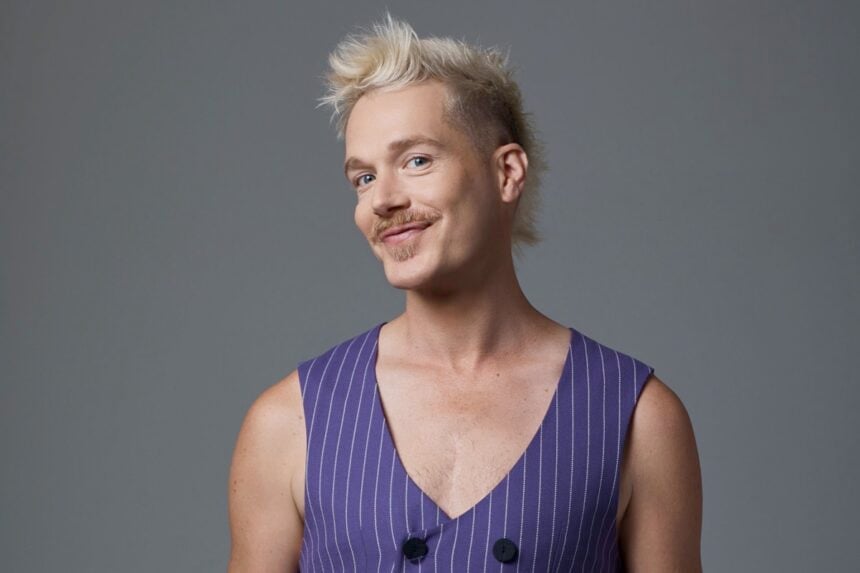
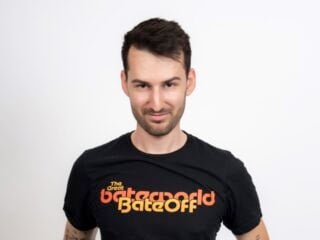











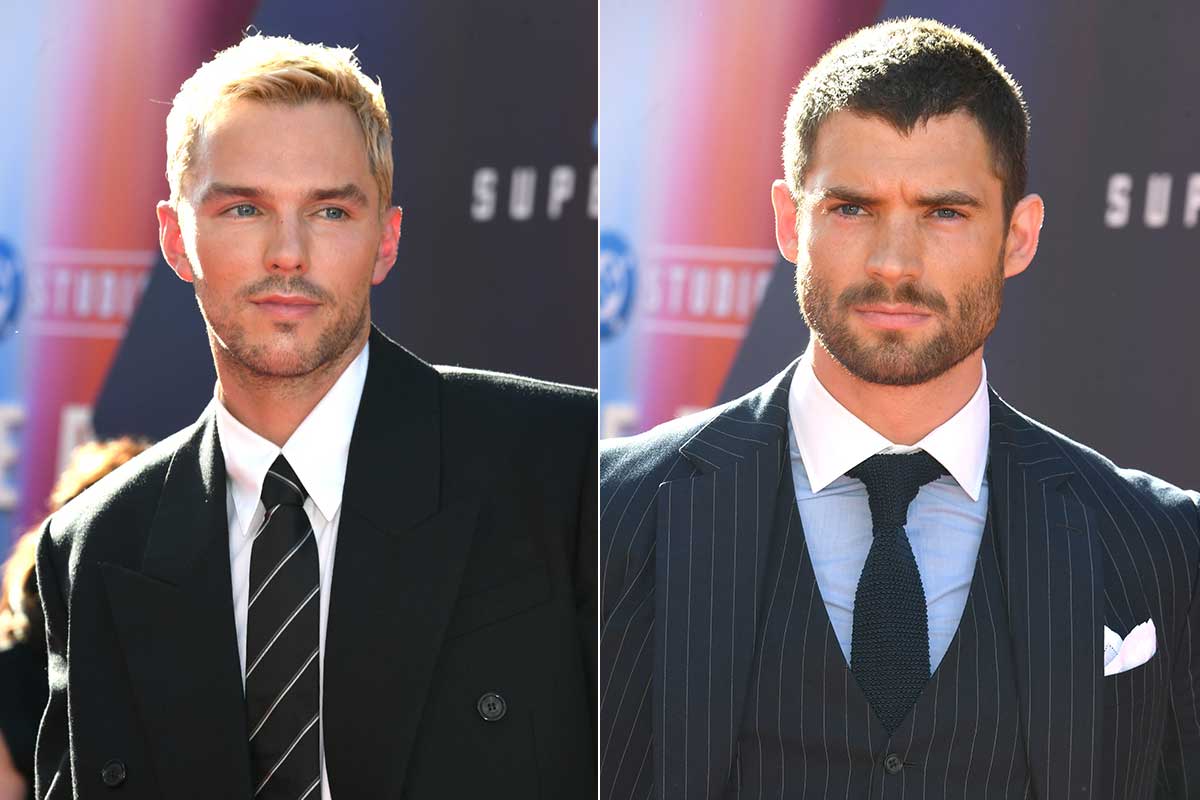
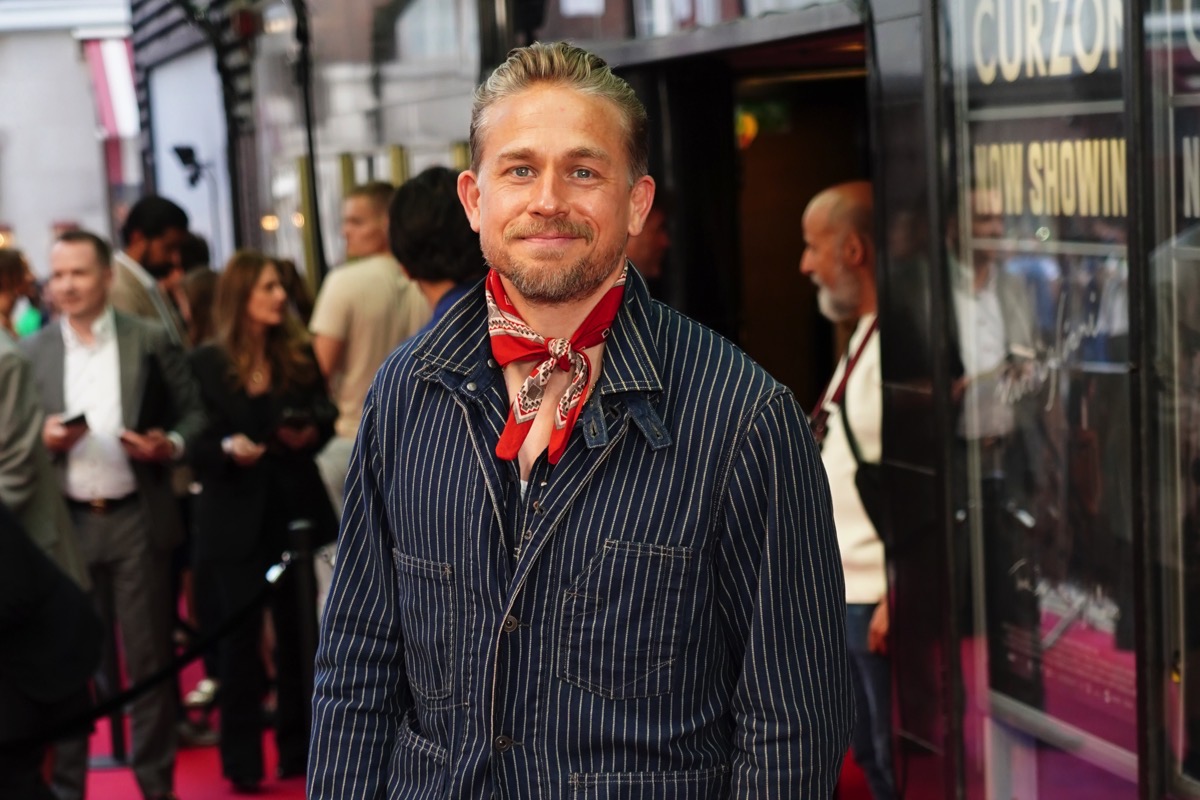
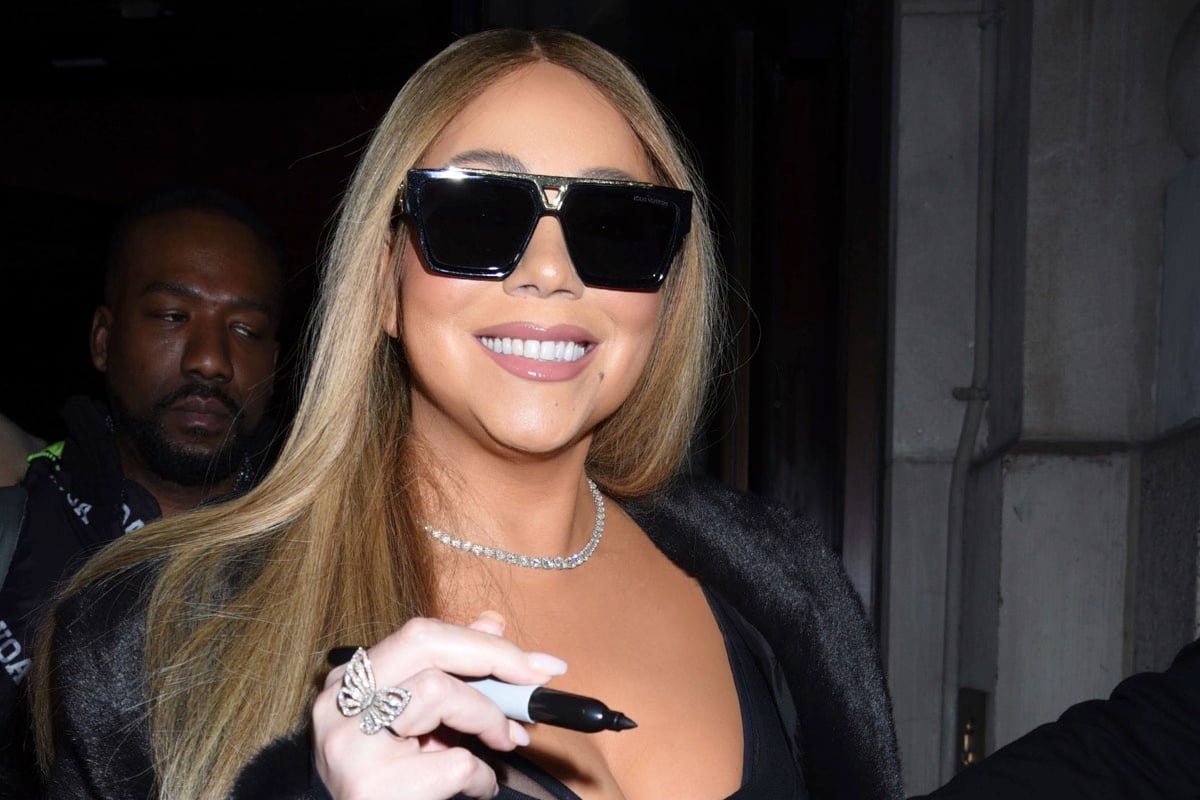


![Apple Watch Series 10 [GPS 42mm case] Smartwatch with Jet Black Aluminium Case with Black Sport Band - S/M. Fitness Tracker, ECG App, Always-On Retina Display, Water Resistant Jet Black Aluminium Case with Black Sport Band 42mm case + Small/Medium band GPS Without AppleCare+](https://m.media-amazon.com/images/I/6105jZyXyPL._AC_SL1500_._SL160_.jpg)
